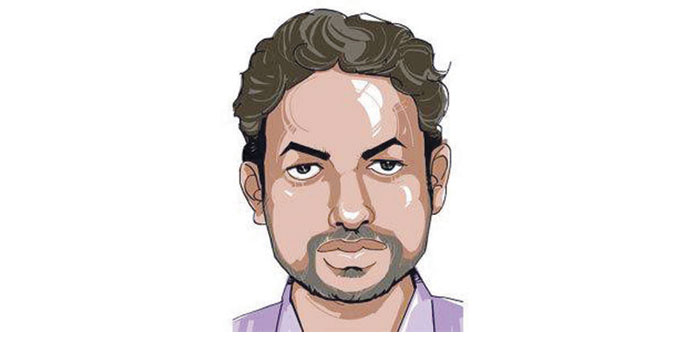Agencies/New Delhi
Police yesterday announced the arrest of the alleged head of militant group the Indian Mujahideen, blamed for a string of deadly attacks including one at a rally by Bharatiya Janata Party’s prime ministerial candidate Narendra Modi last year.
Specialist police based in New Delhi arrested Tehseen Akhtar, 23, alias Monu, one of India’s most wanted men, days after the home-grown militant group’s bomb maker and other members were also taken into custody.
The top officer of Delhi’s anti-terror cell, S N Srivastava, said police found Akhtar at a village near the porous border with Nepal following tip offs from his fellow militants arrested on the weekend.
“We worked on specific tip offs and on that basis we sent a strong team ... and we were successful. We captured Tehseen Monu from Panitanki (village),” Srivastava said at a press conference late yesterday.
Srivastava said Akhtar was responsible for setting up many “modules” of the Indian Mujahideen around the country, describing his arrest as a “big catch.” Akhtar had also helped set up an arms factory in Delhi, he said.
With the country on high security alert for national elections starting next month, media said the arrest was a major breakthrough.
The banned Indian Mujahideen came to public attention in November 2007 following serial blasts in Uttar Pradesh. It is accused of a number of attacks since including in Mumbai, Bangalore, New Delhi and Pune that have killed hundreds.
The group was also blamed for a series of small bomb blasts that killed six people at a rally by Modi in October last year.
Although a favourite of India’s business community and leading in opinion polls, Modi is despised by many Muslims.
He was chief minister of Gujarat in 2002 when the state was engulfed by communal riots that left more than 1,000 people, mostly Muslims, dead.
Police said Akhtar had been in charge of the Indian Mujahideen since last August when its co-founder and the nation’s most wanted man, Yasin Bhatkal, was arrested also near the Nepal border.
The National Investigation Agency had earlier offered a cash reward of Rs1mn ($16,500) for any information on Akhtar, who is believed to be the son of a pharmacist from the eastern state of Bihar.
Akhtar’s arrest comes after Delhi police seized on the weekend suspected key member Ziaur Rehman, also known as Waqas, along with three of his aides in the northwestern state of Rajasthan.
Police said then that those four arrests helped prevent a major militant strike on Indian soil ahead of the elections, which start on April 7 and will be held in nine phases with results expected on May 16.
The outfit is thought to head a network of home-grown militant groups, with some analysts believing it has links with the powerful Pakistan-based Lashkar-e-Taiba (LeT) and Jaish-e-Mohamed militant organisations.
Home-grown militant groups are still a relatively new menace for India, which has traditionally been targeted by groups based in or allegedly directly supported by Pakistan.
Recruits are drawn to the message of fighting for India’s economically disadvantaged Muslims and avenging religious riots such as those in Gujarat in 2002, analysts say.

Akhtar: ‘big catch’
